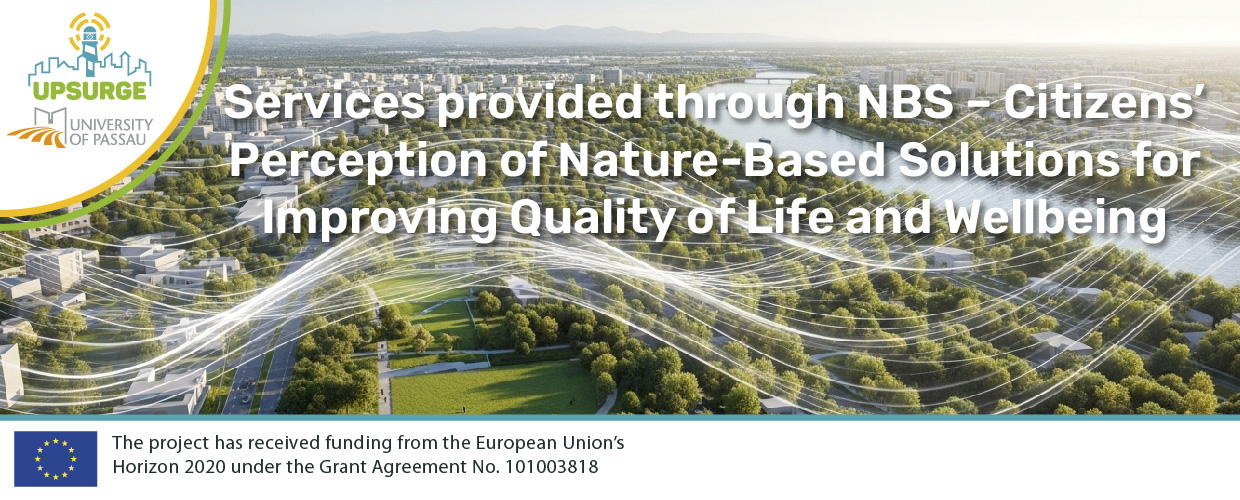Cities are growing fast – and with them, the pressure on people’s health and everyday life. More traffic, sealed surfaces, noise, and limited access to nature all contribute to stress, poorer air quality, and a sense of disconnection from the environment. The H2020 project UPSURGE explores how nature-based solutions (NBS) can counteract these effects and improve citizens’ quality of life and wellbeing.
What are Nature-based Solutions?
According to the European Commission, Nature-based Solutions are “actions inspired by or supported by nature that address societal challenges in a sustainable way.” In cities, this includes a wide range of measures: from green roofs, tree-lined streets, and pocket parks to revitalised rivers, rain gardens, and urban forests. However, UPSURGE goes beyond the physical aspects of greening. The project focuses on the services these spaces provide — cleaner air, noise reduction, cooler microclimates, recreation, social interaction, and a stronger sense of belonging.
In this way, NBS act as service providers in urban environments, improving not only environmental conditions but also how people feel in their neighbourhoods.
What do citizens value about NBS?
As part of UPSURGE, we conducted a large-scale study across twelve European countries to better understand how citizens perceive and benefit from NBS. Nearly 1,900 urban residents were surveyed about their satisfaction with green and blue spaces in their cities, their perceived quality of life, and their environmental attitudes.
The results were clear: citizens strongly agree that nearby green spaces have a positive impact on health (average 4.48 on a 5-point scale) and improve overall quality of life (average 4.44). They also recognise that such spaces increase property values and foster a sense of community. People, therefore, see NBS not as decoration, but as essential urban services that enhance daily life.
However, the study also revealed country-specific differences. In North Macedonia and Greece, for instance, residents placed particularly high importance on having access to green and blue spaces, but their satisfaction with what is available was significantly lower. This gap between expectation and experience highlights a strong demand for improved green infrastructure in certain regions.
Why do NBS matter for wellbeing?
The study found a strong connection between satisfaction with NBS and overall satisfaction with one’s city. Cities that invest in visible, high-quality green and blue spaces tend to have happier residents. In fact, satisfaction with NBS explained more than half of the variation in how satisfied people were with their urban environment.
Another interesting finding: citizens who are more satisfied with their local green spaces also tend to have stronger environmental attitudes. This suggests that experiencing the benefits of nature firsthand can foster a deeper awareness of sustainability — a small but meaningful pathway towards greener behaviour and healthier cities.
Different people, different uses
Across Europe, the main reasons people visit parks, rivers, or community gardens are relaxation (71%), contact with nature (51%), and physical activity (41%). In some countries, such as North Macedonia, green spaces are used intensively as playgrounds for children, while in others, like Germany, they are more often used for sports or recreation. These patterns show that nature-based solutions must be tailored to local lifestyles, climate and cultural habits, rather than implemented as one-size-fits-all models.
What does this mean for cities?
For municipalities and local decision-makers, the message is clear:
- Don’t just create green spaces — maintain and manage them well.
- Focus on services that people directly perceive, such as air quality, shade, noise reduction, and comfort.
- Combine NBS with awareness and participation to strengthen citizens’ connection to nature and the perceived benefits.
Nature-based solutions are more than green spots on an urban map. Citizens perceive them as services that make everyday life easier, healthier and more enjoyable. UPSURGE shows: when cities provide accessible, good-quality blue and green spaces, people reward that with higher satisfaction with their neighbourhood, their city, and even with their life.

Christina Haderer
University of Passau

